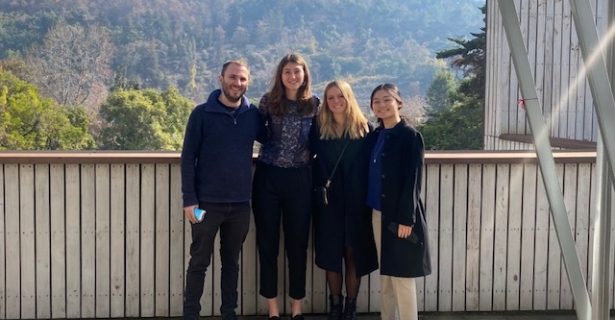It’s June 3, 2022, and we wait in line at Dunkin Donuts at the Santiago airport, anxious to get a quick meal before our plane finishes boarding to Punta Arenas. Unfortunately, the lady tells us in Spanish that they are out of bagel bites, and muffins, and you cannot buy a croissant unless you get the ham and cheese sandwich. Tensions are high, and the Naval Academy boys don’t have enough time to order the renowned Donwich. All they can muster before the flight finishes boarding is 6 munchkins shared between three of them. Matthew hammers down six donuts while grabbing his passport with his sticky fingers.
After 3 hours and 11 minutes, we arrive at Punta Arenas, literally at the bottom of South America. We spend Saturday and Sunday walking around the town. The weather is cold and it is a very off-season time to come, but we spend our time walking along the Strait of Magellan and taking photos of the colorful houses. Punta Arenas is truly the gateway to Antarctica, and we prepare for our meeting with Instituto Antarctico Chileno (INACH) on Monday. INACH is a part of the Ministry of Foreign Affairs in Chile. This meeting was very different from Athena Lab in Santiago, as we spoke with scientists rather than former military generals. Technical Deputy Director Andres Lopez Lara shared a presentation with everyone on INACH’s mission to promote scientific research. The Institute has 451 scientists and is in collaboration with 28 other countries.
One stark contrast was how Chile-Argentina relations are viewed. Lopez assured everyone that there is a strong bilateral partnership between Chile and Argentina in terms of scientific cooperation. Argentina and Chile are major actors and participants in the Antarctic Treaty System. There is frequent cooperation between the different bases of the two countries, and there is the Combined Antarctic Navy Patrol (PANC) launched by the two Navies in 1998. PANC improves navigation safety, environmental protection, and assistance to other Antarctic national programs in Antarctic Peninsula where Chile and Argentina are jointly responsible for Search and Rescue Service. The PANC is still in effect today. Since 2012, the Antarctic departments of the two Foreign Ministries have been holding biannual political coordination meetings for Antarctica which has been proven to be useful for consolidating bilateral relations and coordinating political positions for the main Antarctic fora. Antarctic cooperation is a strategic partnership between the two countries. A Memorandum of Understanding on Antarctic Scientific Cooperation was signed for the first time between the Antarctic Institutes of the two countries in 2016 which heralds important new joint work.
This interview offered an interesting new perspective for our research, and we are grateful to have met with INACH. Tufts, Navy, and West Point also went on a hike in the snow, slipping and falling multiple times throughout due to our lack of hiking boots. Marianna has a heavily bruised elbow as evidence. However, it was so much fun and a great bonding experience between the teams!
We flew back to Santiago to prepare for our interviews at the University of Chile and the US Embassy. Hopefully, we will try the Donwich at Dunkin soon!

